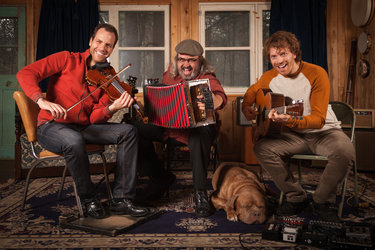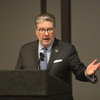Musicians keep native languages and cultures alive
ALTAMONT — This weekend, artists and groups with musical traditions spanning the globe will converge on the fairgrounds in Altamont, for the 35th annual Old Songs Festival.
One such group is the Philadelphia-based Runa, which has its roots in Celtic music, but blends in numerous other influences, co-founder Shannon Lambert-Ryan said this week. The group moves seamlessly from one genre to another, even within the same albums or songs. They explore traditions that include Irish and Scottish music, bluegrass, jazz, and blues.
The quintet’s members’ very different backgrounds and musical training help keep things interesting, she said. Asked what style of music is her personal favorite to play with the group, she said, “For me it’s not about liking one style more than any other, but about how they come together in a particular song that I like.”
In addition to lead singer and manager Lambert-Ryan, who hails from Philadelphia and who has an impressive background as a stage actress and opera singer, the group includes her husband, guitarist and Dublin native Fionán de Barra, who has performed with many of the best-known contemporary Irish musicians; multi-instrumentalist David Curley of Galway, Ireland, who provides mandolin, vocals, bodhrán (Celtic drum), and step-dancing; percussionist Cheryl Prashker of Montreal, Canada; and fiddler Maggie Estes White from Kentucky, trained in both classical violin and bluegrass.
“We’ve always tried to push the boundaries of the Celtic genre with the music that we play,” said Lambert-Ryan, “by using our different backgrounds and interests in our arrangements. It helps to keep it interesting for us and, hopefully, helps to keep it fresh for our audiences as well.”
In addition to performing, Runa will also help lead a Celtic workshop this weekend. According to Lambert-Ryan, they will sing songs in Irish and Scots Gaelic and chat about the language and culture with the audience. They will offer the workshop jointly with other musicians: Calan (a group from Wales) and singer Molly Herbert-Wilson. “We’re so excited to share songs with them,” Lambert-Ryan said.
Lambert-Ryan said that de Barra is a native Irish speaker and “has taken great care working with me to be able to properly pronounce and understand songs in Irish Gaelic and Scots Gaelic.” Just like music and art from any other culture, it’s important to keep the Celtic traditions alive and to share them, she believes. “The more we can share with our audiences and fans, the longer those traditions will continue.”

Fionán (pronounced “fih-nawn”) de Barra was born and raised in Dublin, where he lived until moving to the United States six years ago. To this day, his family uses Irish to communicate with each other. This everyday use of the language is something that many of his friends and colleagues envy, he told The Enterprise. Irish citizens are required to learn the language during all 12 years of schooling — to varying degrees of intensiveness, depending on the school — but speaking it at home is becoming far less common, he explained.
Runa won Top Group and Top Traditional Group in the Irish Music Awards in 2013, as well as an award for Best World/Traditional Song. The band is nominated for the Independent Music Awards in two categories this year as well.
Runa has just released its fourth studio album, “Current Affairs,” featuring three Grammy-Award-winning artists: Ron Block (Alison Krauss & Union Station), Jeff Taylor (Paul Simon, Elvis Costello), and Buddy Greene (Bill Gaither).
The two songs nominated for awards are from the new album. “Ain’t No Grave” is their interpretation of the American gospel song; it starts out mournful Celtic and moves into a quick and catchy folk-rock. “The False Knight on the Road” is an old British ballad about a “wee boy” confidently answering all the questions posed him by a false knight—presumably the devil—and, so, saving his soul. Lambert-Ryan’s crystalline voice here is accompaniment to the real stars, the syncopated drumming and guitars and other stringed instruments.
And one more interesting tidbit about the band Runa: There’s a local family connection.
Co-founder Fionán de Barra is related to Helen Marie Lounsbury of Berne, who taught for many years in the Berne-Knox-Westerlo School District. “Fionán’s grandmother was my mother’s first cousin,” Lounsbury explained.
There is no connection—“at least as far as I know”—between herself, Lambert-Ryan said, and French-Canadian musician Yves Lambert, whose trio will also perform at the festival.
Trio has no place to hide
Yves Lambert explained, through his manager, Philippe Contré — who relayed questions and translated the answers from French to English — that the trio’s roots are in Québécoise French music and Celtic music.
That combination, Lambert said, first arose in the 19th century and incorporated musical influences from Ireland, France, Scotland, and England — the main sources of immigrants to Canada at the time.
The trio recasts this music completely, through their own personal and creative approach, making it equal parts traditional and contemporary.
The group’s name aside, the bearlike and charismatic Lambert is clearly the leader. Many songs feature a bluesy vocal call-and-response between him and the two other band members. His impassioned, coolly accurate vocals are backed by richly layered, tight instrumentals produced by him on accordion (Lambert plays three different Marc Savoy instruments), Tommy Gauthier on violin and mandolin, and Olivier Rondeau on guitar.
Lambert notes that one reason why the sound produced by just three musicians is so rich — besides the arrangements and the balance among and quality of the musicians — is Rondeau’s work with an octaver, or octave effect box, which can make it “sound like there was a bass player on the stage, but there is not.”
Also contributing, he said, are his own and Gauthier’s signature styles. Mostly, though, he said, it’s the combination of the three together that produces something completely original.
Lambert is an iconic figure in traditional French-Canadian music. He played for 26 years with a group called La Botinne Souriante, a modern-traditional folk group that incorporated a horn section. He left it in 2003 because he “needed to return to the source.”
He formed a five-piece band, the Bébert Orchestra, and then, starting in 2009, went with just half that number of players on a tour of small venues in Québec. The group quickly realized that “it was pretty amazing to play as a three-piece band,” Lambert said.
The trio made its first record together in 2012. The larger, five-piece group still plays several concerts a year.
The trio, Lambert said, is a welcome challenge “because there is more space on the stage, so it requires more effort to occupy this space.”
Musicians in a trio cannot hope to hide behind the other players, he suggested. “There is also not much room for the hidden, so you need to work all the time and give a lot to the audience.”
Asked why they always sing in French, Lambert said, “The French is genetic, it expresses our differences but also cultural wealth of the region.”
As for his future plans, Lambert said that he is currently working on a record that will “review all my 40 years of songs.” He is collaborating on the album with Montreal musician Josh Dolgin, “a genius,” Lambert says, who goes by the artist name “Socalled.”
Lambert is also planning an accordion project with Sergiu Popa, a Moldovan accordionist who is “a real virtuoso.”
And, he adds, “I would like to become an innkeeper.”
****
The 35th Old Songs Festival will be held June 26, 27, and 28 at the Altamont fairgrounds. An adult all-festival ticket, with camping, costs $150; without camping, $130. Tickets are also available for a single day or for just Saturday evening.
Runa and the Yves Lambert Trio will both be performing on Saturday and again on Sunday. Check the festival’s website, at www.festival.oldsongs.org, for specific times and locations within the fairgrounds.



